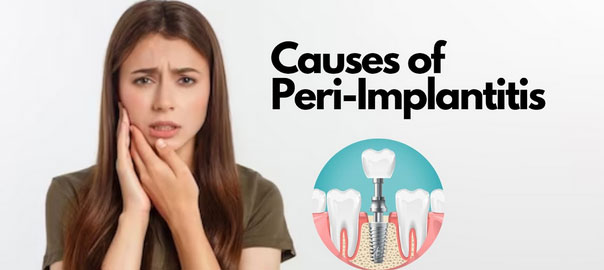
Peri-Implantitis: Exploring the Root Causes of Implant Complication
Dental implants have revolutionized the field of dentistry, offering patients a durable and aesthetically pleasing solution for missing teeth. However, like any medical procedure, complications can arise, and one such challenge is peri-implantitis. In this blog post, we will delve into the root causes of peri-implantitis, shedding light on the factors that contribute to this condition.
What is Peri-Implantitis?
Peri-implantitis is a condition characterized by inflammation and infection of the soft and hard tissues surrounding a dental implant. It can lead to bone loss around the implant, potentially jeopardizing its stability and, in severe cases, resulting in implant failure. Understanding the causes of peri-implantitis is crucial in preventing and managing this complication effectively.
Causes of peri implantitis include:
-
Poor Oral Hygiene
Just as with natural teeth, maintaining proper oral hygiene is vital for the longevity of dental implants. Inadequate brushing and flossing can lead to the accumulation of plaque and bacteria around the implant site, triggering inflammation and infection. Neglecting oral hygiene practices is one of the primary causes of peri-implantitis.
-
Smoking
Smoking has long been associated with various dental problems, and peri-implantitis is no exception. Smoking impairs the body’s immune response, making it more challenging to fight off infections. Additionally, tobacco use restricts blood flow, impairing proper healing and increasing the risk of complications after implant placement.
-
Pre-existing Periodontal Disease
Patients with a history of periodontal (gum) disease are more susceptible to developing peri-implantitis. Periodontal disease weakens the supporting structures around natural teeth, and the same can occur around dental implants. Infection from untreated periodontal disease can spread to the implant site, leading to inflammation and subsequent bone loss.
-
Biomechanical Factors
Inadequate implant placement, overloading of the implant, or excessive forces on the implant during biting and chewing can contribute to peri-implantitis. When the implant and its prosthetic crown do not function harmoniously with the natural teeth, it can lead to excessive stress on the implant and surrounding tissues, resulting in inflammation and bone loss.
-
Genetic Predisposition
Research suggests that genetics can play a role in determining an individual’s susceptibility to peri-implantitis. Certain genetic variations may affect the body’s immune response and its ability to fight off infections, making some individuals more prone to developing peri-implantitis.
Prevention and Management
Preventing peri-implantitis requires a comprehensive approach involving both patients and dental professionals. Maintaining excellent oral hygiene through regular brushing, flossing, and professional cleanings is essential. Smokers should be encouraged to quit, as it not only improves overall oral health but also reduces the risk of implant complications. Patients with a history of periodontal disease should undergo thorough treatment and maintenance to minimize the risk of peri-implantitis.
Regular follow-up appointments with your dental Implantologist are crucial to monitor the health of dental implants. Early detection of peri-implantitis allows for timely intervention and increases the chances of successful treatment. Treatment options may include non-surgical interventions such as professional cleanings, antimicrobial therapy, and improved oral hygiene practices. In more advanced cases, surgical interventions such as implant decontamination, bone grafting, or implant removal may be necessary.
Peri-implantitis is a challenging complication that can compromise the success of dental implants. By understanding the root causes of this condition, patients and dental professionals can work together to prevent its occurrence and effectively manage.
Leave a Reply
Leave a Reply
Explore More Similar Posts
Explore More Blogs


Leave a Reply